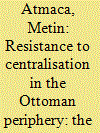|
|
|
Sort Order |
|
|
|
Items / Page
|
|
|
|
|
|
|
| Srl | Item |
| 1 |
ID:
158077


|
|
|
|
|
| Summary/Abstract |
At the start of the First World War the Committee of Union and Progress (CUP), the ruling party of the Ottoman Empire, used numerous means to ensure that the Kurdish leaders remained allies. Interpretations of Jihad became a major tool for recruitment of Kurdish soldiers by all sides in the war, including the Ottomans, Russians, British and Kurds, though the tactic had limited success. During this period, several religio-political leaders emerged among the Sufi orders in Kurdistan and created their own regiments that fought alongside the Ottomans. Other leaders sided with Russian and British forces. Among those leaders that did not support the Ottomans, Sayyid Taha II arose as a rational, yet unorthodox political figure. His political maneuvering proved that the frontiers were fragile, fluid and impermanent. The present study aims to show that in the context of the First World War the Kurdish leaders of the time, primarily Sayyid Taha II, vis-à-vis the non-religious notables in Istanbul, were transformed into political leaders by their experiences during and after the war.
|
|
|
|
|
|
|
|
|
|
|
|
|
|
|
|
| 2 |
ID:
164902


|
|
|
|
|
| Summary/Abstract |
Modern Kurdish historiography, which examines resistance to provincial centralisation in Ottoman Kurdistan, focuses largely on Bedir Khan’s Bohtan emirate and his revolt in the 1840s, while ignoring the rest of the other Kurdish emirates such as Baban emirate. While both states, Qajar Iran and Ottoman Empire, were endeavouring to solve their conflicts in the 1840s (a process which culminated in the treaty of Erzurum in 1847) the future of the Baban emirate and its territories emerged as one of the major issues during the course of negotiations. The Baban emirate was the last emirate to give up its struggle against the Sublime Porte’s centralisation reforms. The legacy of the Kurdish emirates is important to understand better the relations between the centre of the Ottoman Empire and its eastern periphery, a much less studied subject in Ottoman historiography. This article will highlight the impact of the centralisation policies in Kurdistan, more specifically on territories of the Bohtan and Baban emirates. It will be demonstrated that the changes wrought by the Tanzimat reforms were partially successful in transforming the Kurdish notables, who later became a part of the state bureaucracy. However, the reform-minded officials, who were appointed after the Kurdish emirs were removed from the region, failed to persuade the locals in favour of the new administration thus transforming their lives.
|
|
|
|
|
|
|
|
|
|
|
|
|
|
|
|
|
|
|
|
|